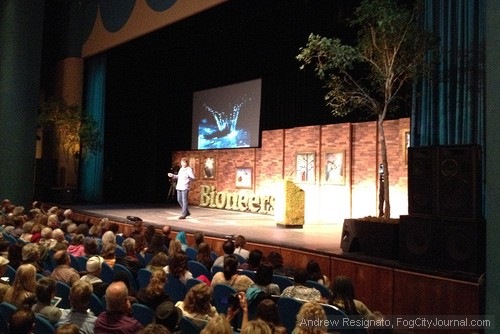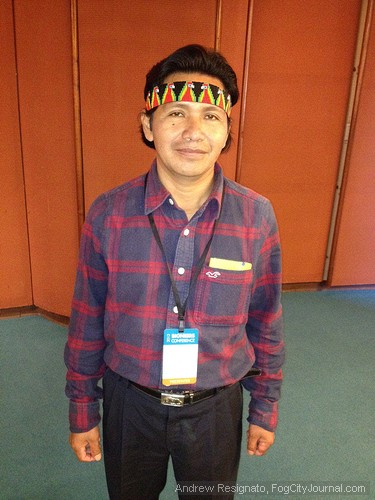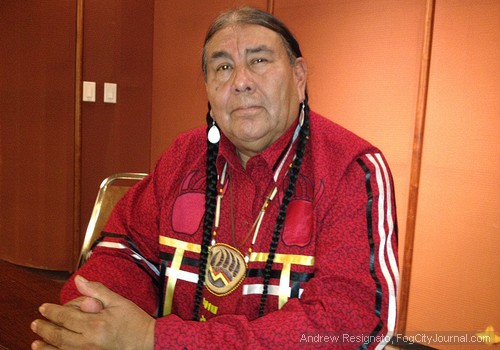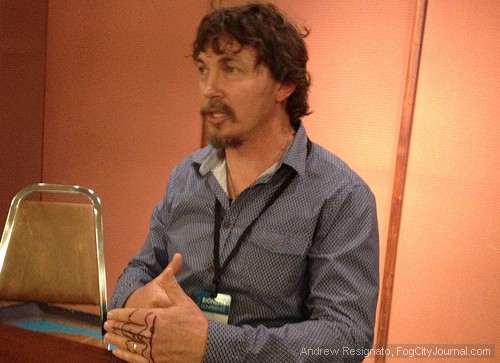
The 24th annual National Bioneers Conference was held last week in San Rafael. Photos by Andrew Resignato.
October 25, 2013
A friend of mine asked me if I was going to the National Bioneers Conference this past weekend in San Rafael. I was not aware of the conference before she told me about it but I decided to apply for a media pass and cover a day of the conference for FCJ. Notably, there was very little other media and I saw no mainstream media outlet covering the conference.
According to their website, Bioneers is a non-profit New Mexico corporation founded in 1990 that identifies progressive, yet nature-honoring solutions to rising challenges of instability, inequality and unsustainable growth, and disseminates this knowledge via independent media, events and community action networks.
The conference, which is in its 24th year, is billed as an event where “prominent and emergent scientific, sustainability, economic, environmental, social justice, diversity, and innovation experts convene to discuss and present their works to the public.”
I attended the conference on Saturday and the first speaker was biologist, author, and the “godmother of biomimicry,” Biomimicry Institute President Janine Benyus. She reminded the audience that humans are an amazing species but we are relatively young at 200 thousand years.
According to Wikipedia, biomimicry “is the imitation of the models, systems, and elements of nature for the purpose of solving complex human problems.” One example is when researchers studied termites’ ability to maintain virtually constant temperature and humidity in their termite mounds in Africa despite extreme outside temperature variations. After studying this phenomenon and modeling termites’ mound design, engineers constructed a building in Harare, Zimbabwe,which stays cool without air conditioning and uses only 10 percent of the energy of a conventional building its size.
Since nature has been experimenting through a process of trial and error to refine organisms and processes on Earth for over 3 billion years, Benyus said, “We should make it a daily practice of asking nature for help” to solve many of our collective human problems. The field of biomimcry is expanding and Benyus reminded the audience that the solutions for many of our issues can be solved simply by observing and mimicking nature.
The plight of the world’s indigenous peoples and cultures is a major focus at the Bioneers conference. To biologists, the concept of biodiversity is an important one because biological diversity is important to the health of ecosystems. A healthy biodiversity allows nature’s 3 billion year old experiment to continue and thrive. While indigenous peoples make up 4 percent of the world’s population, they live on 80 percent of the Earth’s most biologically diverse lands. The Amazon region is one such area. However, there are natural resources in these regions, including much sought after oil.
Currently, in countries like Ecuador, oil companies are trying to extract oil that lies in the Amazon rain forests. Another conference speaker, Franco Viteri , from the Pachamama Alliance, said through an interpreter, that indigenous women who reside in these rain forests recently marched 300 miles to the capitol, Quito, to protest the drilling and the degradation of the Amazon biosystem through exploitation of the rain forest. He said for indigenous people, “Wealth is about clean air, clean water and peace, and not so much about the accumulation of material wealth, which is really more about vanity.”

Franco Viteri.
Another speaker, the Director of the Indigenous Environmental Network, Tom Goldtooth, said, “The future of mankind depends on a new economic and environmental paradigm. There is something fundamentally wrong with treating the Earth like a business in liquidation.”

Tom Goldtooth.
Issues related to food production and building a healthier, more just and sustainable food system, is another focus of Bioneers. According to the conference program, “Large-scale modern agriculture is the world’s largest industry and the most ecologically destructive human activity.”
On that subject, Darren Doherty, a Regenerative Agriculture practitioner, talked about his work helping farmers implement farming practices that are less harmful to ecosystems. Doherty said, “We live in an information-rich world, but there is not enough knowledge. Societies that are best equipped to survive are those that are equipped to change.”
Large scale, oligopolistic industries tend to change very slowly. Doherty’s mission is to move us past what he calls, a “state of atrophy” to a state of regeneration. He asks the question, “Do we have the will to change our patterns of consumption to support the regeneration of our ecosystems?” and for land managers, “Do our efforts to feed and clothe the masses come whilst regenerating our landscapes, soils, communities and waters?”
Doherty uses permaculture system principles which, like biomimicy, utilize the patterns that nature has created to develop and teach farming practices that are not just more environmentally friendly, but are also more efficient. “We now have so many tools and technological aids to accomplish this that there is simply no excuse,” he said.

Darren Doherty.
In a conference breakout session, I spoke with Erik Assadurian from the Worldwatch Institute. He said his organization is trying to find ways to change cultures to make them more ecocentric. Assadureian asserts that many of our current systems are unsustainable and we will have to change one way or the other to avoid inevitable environmental upheavals. If humans fail to implement changes that can ameliorate the effects of environmental degradation, we could lose some of the social institutions we have come to enjoy as things destabilize, Assadurian asserted.
“Institutions like Democracy could be lost as humans are faced with more dire choices,” Assadurian said. “It is the difference between dieting and starvation. Weight loss is the result, but the former is preferable to the latter.”
Many of the speakers from this year’s conference can be viewed on the Bioneers youtube channel.


 The Hunger Site
The Hunger Site
No Comments
Comments for Bioneers: Paving a Way to a Sustainable Future are now closed.